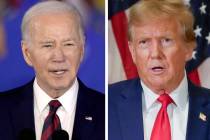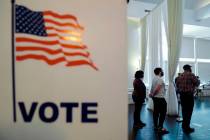Lawmakers must reset Nevada’s old revenue structure
Gov. Brian Sandoval is right to declare himself "proudly optimistic" about Nevada's prospects as he formulates his first budget.
Optimism is the Nevada creed, and Nevadans will need a lot of it as the Legislature wrestles with a two-year budget shortfall of perhaps $3 billion.
And yet, optimism will not be all the state requires in the coming months as it is facing more than a passing, albeit challenging, budget problem.
Nevada, like many other states, faces a full-blown public-sector fiscal crisis that, while not so dire as that in Arizona and California, has the power to preoccupy the state for years, hobble recovery and turn the state inward just when it needs to raise its aspirations and look outward.
This crisis will not pass once the present budget gaps are narrowed. Nor will it likely dissipate once the economy recovers. And so Gov. Sandoval and the Legislature need to complement optimism with true, objective realism about the scale and nature of Nevada's "structural" budget challenge.
A report recently released by my group at Brookings Mountain West, working in partnership with the Morrison Institute of Public Policy at Arizona State University, lays out the problem.
On the one hand, the state faces a large "cyclical" or short-term deficit, the temporary fallout of the Great Recession given the sharp and continuing decline of taxable economic activity in states. Running to a whopping 18 percent of general fund spending in Nevada in fiscal year 2011, these shortfalls, while serious, will narrow as the still-troubled Western economy picks up. In that sense, these gaps of hundreds of millions of dollars are the easier part the problem.
Harder, because they are more entrenched, are what we call the states' "structural" deficits -- the more or less permanent imbalances of revenues and expenditures that can arise from how a state's fiscal structure interacts with the economy, fundamental changes in the economy or the state's demographics, or imprudent or shortsighted policy choices.
The good news here is Nevada doesn't have a huge structural deficit -- yet. Unlike California, which chronically spends too much, and Arizona, which has given away the store over 15 years through excessive tax cuts, Nevada's revenues and expenditures have more or less tracked with each other, notwithstanding the Great Recession, although spending for K-12 and higher education have been consistently under-funded.
The trouble is that while Nevada does not now have a large structural problem it almost surely will soon develop one.
Nevada, after all, has one of the most narrow and consumption-oriented revenue structures in the nation, with nearly two-thirds of the state's revenue flowing from gaming and sales taxes. That revenue base worked well with in-migration at super-high levels, home building on a tear, and gaming and tourism receipts rolling in. However, with migration, real estate, and consumption likely down for years, it is extremely unlikely the old revenue system will yield sufficient revenue going forward. In short, a tax structure built to generate revenues off migration and consumption will almost certainly fall short during the coming "new normal" of depressed migration and tepid consumption.
So what should the state do? Basically, Nevada needs to reset its revenue structure to suit the economy it now has, rather than one it used to have.
The state will need to recognize its budget deficits are likely deeper and longer lived than the present recessionary dip.
The state, in short, will need to rethink its fiscal structure.
Nevada must commit to budgetary balance and revenue diversification -- key tenets of sound fiscal management. The region's massive budget gaps cannot responsibly be closed with only spending reductions.
Another sort of balance should be sought: diversification of the tax system. Nevada needs to at minimum expand the base of its sales tax and most likely consider adding to the revenue mix some sort of business activity tax, such as the commercial activities tax in Ohio or the "margins" tax in Texas, since these gross receipts taxes may not run afoul of the state's constitution.
In sum, Nevada -- battered, definitely, but also fortunate by comparison to Arizona and California -- should keep its head, look hard at changing realities, and make some smart adjustments to tune an aging revenue system to the new economic normal.
If it does this the state will begin to rebuild on a sounder base. If it fails, the state could well turn its short-term problems into chronically structural ones that will consign it to a path of relative decline.
Mark Muro is the co-director of Brookings Mountain West and a senior fellow at the Metropolitan Policy Program at Brookings. He is a co-author of the Brookings Mountain West paper "Structurally Unsound: Cyclical and Structural Deficits in California and the Intermountain West," available at: www.brookings.edu/papers/2011/0105_state_budgets.aspx.
This is the latest in an occasional series in which community leaders offer state lawmakers their perspectives on the priorities of the 2011 legislative session, which begins Monday in Carson City.

















